Stanley Baker
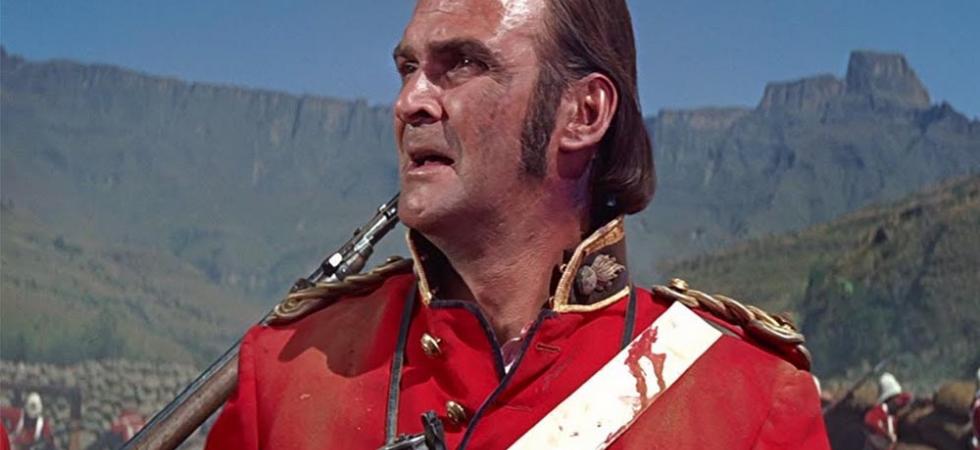
SIR WILLIAM STANLEY BAKER was a Welsh actor and film producer, widely remembered as the producer and lead actor in the acclaimed 1964 film Zulu.
Known for his rugged appearance and intense, grounded screen persona; he was one of the top British male film stars of the late 1950s and early 1960s, and later a prolific producer.
He is known for his lead role in Hell Drivers and supporting role in The Guns of Navarone, but most significantly for Zulu, in which he portrayed John Chard.
Baker’s performance in the 1959 film Yesterday’s Enemy was nominated for the BAFTA Award for Best British Actor, and he was nominated for a Primetime Emmy Award for his turn in the BBC serial How Green Was My Valley.
Born into a coal mining family in Ferndale, Glamorgan, on February 28, 1928, growing up a self-proclaimed “wild kid” interested in only football and boxing. He thought he would most likely be a miner or maybe a boxer.
However, his artistic ability was spotted at an early age by a local teacher, Glynne Morse, who encouraged Baker to act. When he was 14 he was performing in a school play when seen by a casting director from Ealing Studios, who recommended him for a role in Undercover (1943), a war film about the Yugoslav guerrillas in Serbia.
Baker worked for a time as an apprentice electrician, then through Morse’s influence, he managed to secure a position with the Birmingham Repertory Theatre in 1944. He was there for three years when he had to do his national service. He served in the Royal Army Service Corps from 1946 until 1948, attaining the rank of sergeant.
After the Second World War, he befriended actor Richard Burton and began appearing in film and television roles. He appeared alongside Burton in a play in the West End called The Druid’s Rest.
He was recommended by Burton for casting in a small role in Terence Rattigan’s West End play, Adventure Story (1949).
In 1950, Baker married the actress Ellen Martin, who had been introduced to him by Burton. Their marriage lasted until his death and they had four children, Martin and Sally (twins), Glyn and Adam. Glyn appeared in The Wild Geese (1978), opposite Burton, and in Return of the Jedi (1983), as Lieutenant Endicott, the imperial officer who delivered the line, “Inform the commander that Lord Vader’s shuttle has arrived.”
He began appearing in films and on television, as well as performing on stage for the Middlesex Repertory Company. He had small roles in All Over the Town (1949), Obsession (1949), Your Witness (1950), Lilli Marlene (1950), Something in the City (1950), The Rossiter Case (1951), Cloudburst (1951), Home to Danger (1951) and Whispering Smith Hits London (1952).
His TV roles around this time included The Tragedy of Pompey the Great (1950) and Rush Job (1951).
Baker attracted attention when cast as the bosun’s mate in the Hollywood-financed Captain Horatio Hornblower (1951), one of the top 10 most popular films at the British box office that year.
In 1951, he toured England in a play by Christopher Fry, A Sleep of Prisoners, which was part of the Festival of Britain. It was about four prisoners of war spending a night in a bombed-out church; the rest of the cast included Denholm Elliott, Hugh Pryse and Leonard White. The project was transferred in its entirety to New York for a limited run, and also toured throughout the US.
While in New York, Baker read the novel The Cruel Sea by Nicholas Monsarrat. Attracted to the idea of playing the unpleasant and somewhat cowardly Bennett, he lobbied successfully for the role in the 1953 film version. It was the most successful film at the British box office in 1953 and Baker was now firmly established as a big screen presence.
On television, he was in A Cradle in Willow and played Petruchio in a version of Taming of the Shrew (1952). He had a small role in a British-US co-production for Warwick Films, The Red Beret (1953), with Alan Ladd, another big hit in Britain. Warwick liked his work so much they promptly reteamed him with Ladd in Hell Below Zero (1954), with Baker billed as the main villain.
Baker got another break when George Sanders fell ill and was unable to play Sir Mordred in the expensive epic Knights of the Round Table (1953), made by MGM in Britain. Baker stepped in and received excellent reviews.
He had his biggest role in a purely British film to date with The Good Die Young (1954), directed by Lewis Gilbert, playing a boxer who commits a robbery. Baker was cast in Twist of Fate (1954) opposite Ginger Rogers. Hollywood came calling again and offered him the choice support role of Achilles in Helen of Troy (1955), shot in Italy for Robert Wise.
Most of Baker’s film roles until this stage had been playing villains. His career received another boost when Laurence Olivier selected him to play Henry Tudor in Richard III (1955).
On TV, he was in The Creature (1955) by Nigel Kneale, later filmed (without Baker) as The Abominable Snowman. He was in another epic, playing Attalus in Alexander the Great (1956), which starred Burton in the title role and was shot in Spain for Robert Rossen. He also portrayed Rochester in a British TV adaptation of Jane Eyre (1956).
Baker’s first leading role in a feature film came with Child in the House (1956), written and directed by Cy Endfield. He had a support role as a psychotic corporal in A Hill in Korea (1956), a Korean War film that also featured early performances from Michael Caine, Stephen Boyd and Robert Shaw. He was the villain in a racing car drama, Checkpoint (1956), opposite Anthony Steel. It was made by the team of Betty E Box and Ralph Thomas for the Rank Organisation.
Baker finally broke away from supporting parts when cast as the lead in Hell Drivers (1957), a truck-driving drama. Before it was released, he played another villain role for Box and Thomas, Campbell’s Kingdom (1957), opposite Dirk Bogarde, shot in Italy (substituting for Canada).
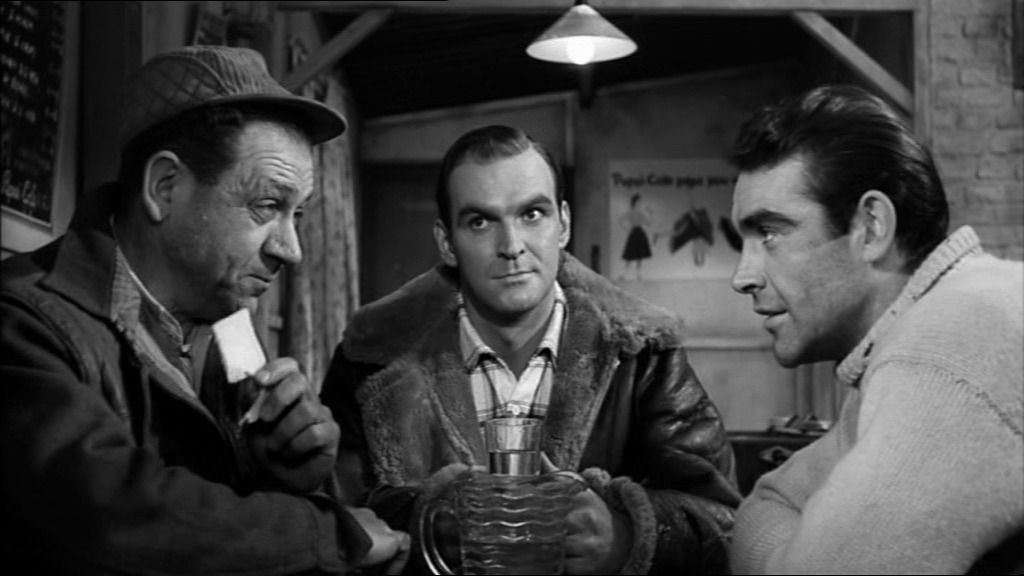
Hell Drivers was a minor hit, and at the end of the year exhibitors voted Baker the seventh most popular British star at the British box office for 1957 (after Bogarde, Kenneth More, Peter Finch, John Gregson, Norman Wisdom and John Mills, and ahead of Ian Carmichael, Jack Hawkins and Belinda Lee).
The success of Hell Drivers saw Baker play a series of tough anti-heroes. In the words of David Thomson: “Until the early 1960s, Baker was the only male lead in the British cinema who managed to suggest contempt, aggression and the working class. He is the first hint of proletarian male vigor against the grain of Leslie Howard, James Mason, Stewart Granger, John Mills, Dirk Bogarde and the theatrical knights. Which is not to disparage these players, but to say that Baker was a welcome novelty, that he is one of Britain’s most important screen actors, and that he has not yet been equalled – not even by Michael Caine.”
Baker was a detective in Violent Playground (1958), a drama about juvenile delinquency from the director-producer team Basil Dearden and Michael Relph. He played a tugboat captain in the action-drama Sea Fury (1958).
He made the Hollywood-financed The Angry Hills (1959) in Greece with Robert Aldrich, opposite Robert Mitchum. Baker said Aldrich offered to engage him in a 28-part series about an Englishman in New York, but he had turned it down to stay in Britain.
Baker had the lead in Yesterday’s Enemy (1959), a World War II drama set in Burma for Hammer Films. He was a detective in Blind Date (1959) for director Joseph Losey, one of Baker’s favourite roles, and an airline captain in Jet Storm (1959).
Hell is a City (1960) had him as another hard-bitten detective, and then he was an ex-con in The Criminal (1960). He played the relatively small role of ‘Butcher Brown’, a war-weary commando, in the Hollywood blockbuster war epic The Guns of Navarone (1961) shot in Greece. It was a massive hit at the box office.

In Eva (1962), a French-Italian film, Baker acted opposite Jeanne Moreau. He was asked him to play another villain role, in the Biblical epic Sodom and Gomorrah (1962).
He was a tough army officer committing a robbery in A Prize of Arms (1962) but the film failed at the box office and it seemed the market for the tough action films in which Baker had specialised might be drying up. He appeared opposite Jean Seberg in In the French Style (1962), a French-American romance and was in The Man Who Finally Died (1963) for British TV.
Baker’s widow later claimed that he was originally offered the role of James Bond, but turned it down not wanting to commit to a long-term contract. She also said he was going to star in This Sporting Life but had to drop out when Guns of Navarone went over schedule. She said Baker never regretted losing the part of Bond to Sean Connery but regretted not making This Sporting Life.
Baker formed his own company, Diamond Films, with Cy Endfield. They developed a script about the Battle of Rorke’s Drift written by Endfield and John Prebble. While making Sodom and Gomorrah, Baker struck up a relationship with that film’s producer, Joseph E Levine, which enabled him to raise the $3 million budget for Zulu, directed by Endfield, shot partly on location in South Africa.
Zulu was a big hit at the box office and made a star of Michael Caine. Baker played the lead part of Lieutenant John Chard VC in what remains his best-remembered role. He later owned Chard’s Victoria Cross and Zulu War Medal from 1972 until his death in 1976.
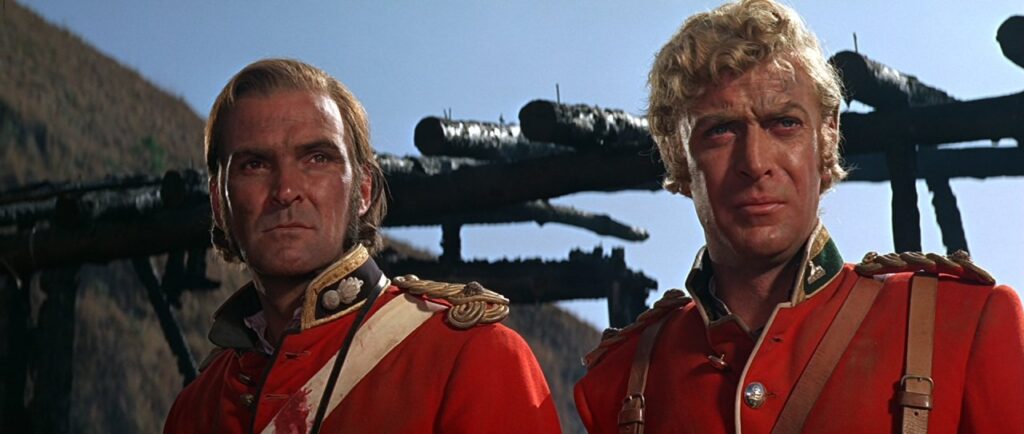
Baker made two more films in South Africa: Dingaka (1965), on which he worked as an actor only, and Sands of the Kalahari (1965), which he starred in and produced. Both were box-office failures commercially.
He made a TV movie for the United Nations entitled Who Has Seen the Wind? (1965), and appeared in two episodes of Bob Hope Presents at the Chrysler Theatre: After the Lion, Jackals (1966) and Code Name: Heraclitus (1967). He made a final film with Losey, Accident (1967), cast against type as an academic.
Baker formed the production company Oakhurst Productions with Michael Deeley. Its first cinema film was Robbery (1967), a heist film with Baker in the lead role.
It was a solid success in Britain and launched the Hollywood career of director Peter Yates. Baker announced he would make another film for Levine, A Nice Girl Like Me acting, opposite Hayley Mills who would play a girl who constantly gets pregnant. The film would be made by Levine, but not with Baker or Mills. He appeared in The Girl with the Pistol (1968), an Italian comedy, then worked as a producer only on two films for Oakhurst: The Other People (1968), which was never released, and The Italian Job (1969) a heist comedy with Caine, a big hit.
Baker produced and starred in Where’s Jack? (1969) for Oakhurst opposite Tommy Steele for director James Clavell. In the early 1970s, as an actor only, he appeared in The Games for 20th Century Fox. He featured in two films for producer Dimitri de Grunwald: The Last Grenade, playing a mercenary, and Perfect Friday, a heist movie directed by Peter Hall which Baker helped produce.
Baker’s last big-screen role in Innocent Bystanders (1972) looks and feels like a hard-boiled, low-rent James Bond. Proof Baker could still do tough guys well, his character, John Craig, is a traumatised spy long past his peak, who is assigned one last job by his reptilian boss (Donald Pleasence).
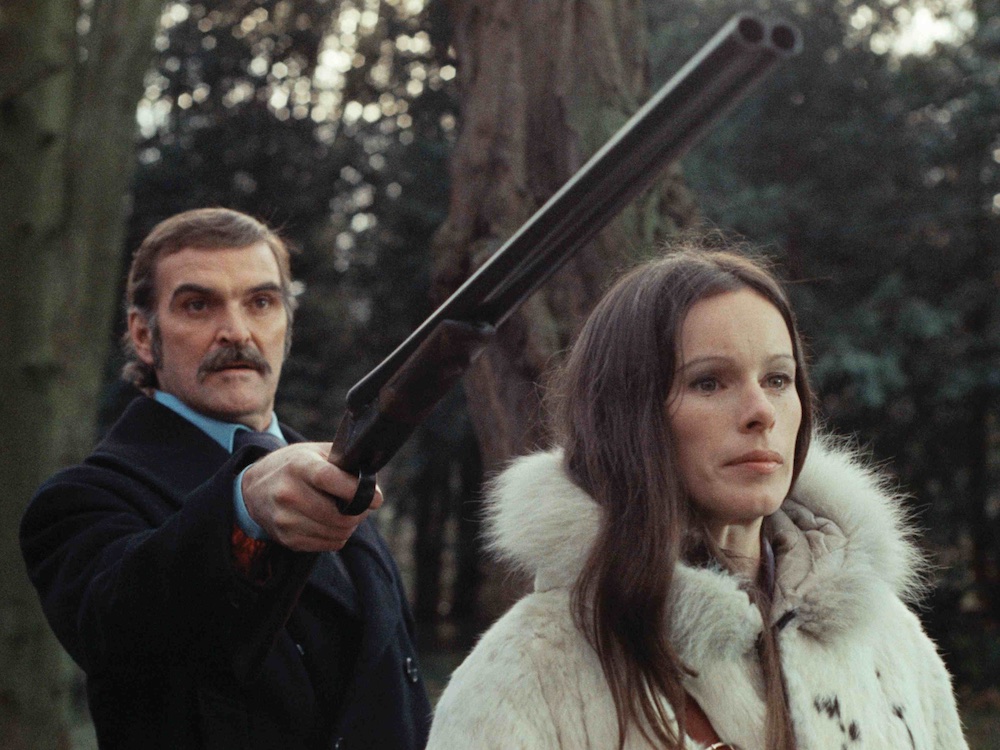
“I don’t make films to see myself perform, I do it to act,” Baker once said. “I’ve enjoyed everything I’ve worked on, including the bad pictures… I enjoy being a working actor. I’ve been accused by journalists of lack of discretion, lack of taste. Well, I’d rather have that lack than the lack of having made them.”
He also expanded his business interests. He was one of the founder members of Harlech Television, and was a director of it until his death.
With Michael Deeley and Barry Spikings, he formed Great Western Enterprises, which was involved in a number of projects in the entertainment field, notably music concerts. Baker, Deeley, and Spikings were also part of a consortium that bought British Lion Films and Shepperton Studios.
However, Baker was the victim of bad timing. The British film industry went into serious decline at the end of the 1960s. His commercial foray into pop music festivals was financially disastrous, with the Great Western Bardney Pop Festival in Lincoln ending up losing £200,000.
Baker was forced to keep acting to pay the bills, often accepting roles in poor films which adversely affected his status as a star.
Towards the end of his life Baker pulled back on his business activities and worked mostly as an actor, taking roles in television including two of the BBC’s Play of the Month series: The Changeling and Robinson Crusoe, plus Who Killed Lamb? and Graceless Go I.
Baker’s final British performance was in a BBC Wales adaptation of How Green Was My Valley (1975), broadcast shortly before he was diagnosed with cancer. Before his death, he was planning on producing a prequel to Zulu, Zulu Dawn.
Baker was politically a Socialist, and a personal acquaintance of Prime Minister Harold Wilson. He was an opponent of Welsh nationalism and recorded television broadcasts in support of the Welsh Labour Party. In a 1969 interview he said: “I’m a Welshman and proud of it, but I’m no nationalist. I think the Welsh Nationalists are foolish and misguided people.”
Baker was a heavy cigarette and cigar smoker, and was diagnosed with lung cancer in February 1976. He died from pneumonia on June 28, 1976, in Málaga, Spain, aged 48. He was awarded a knighthood in 1976, although he died before the investiture ceremony.
His body was cremated at Putney Vale Crematorium, his ashes being scattered on a hillside overlooking his childhood home.
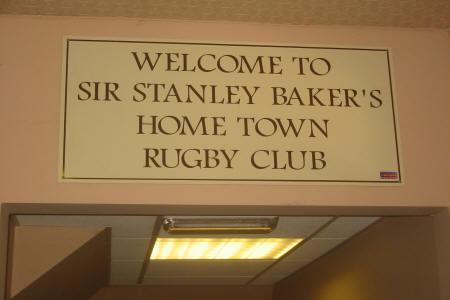
Ferndale RFC, a rugby club in the Rhondda valleys, south Wales, established a tribute to Baker in the form of their Sir Stanley Baker Lounge. Officially opened on Friday, November 24, 2006, the day’s events featured a presentation to Sir Stanley’s sons and family members, and a fitting and moving tribute to the man himself via speeches and tales from celebrities and various local people who knew him best.
The afternoon also featured a BBC Radio Wales tribute to Baker, hosted by Owen Money and recorded live in Ferndale RFC itself. The Sir Stanley Baker Lounge features many pictures and memorabilia from his successful career, including a wall plaque commemorating the official opening in both English and Welsh.
BACK TO HOME PAGE